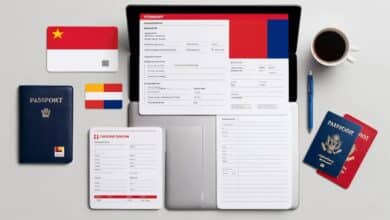Houston, Texas Visa Sponsorship: Key Advantages and a Clear Application Plan
Texas’ largest city has become a hotspot for foreign professionals seeking career growth in the United States.
With over 200 active H1B sponsors in 2024, the region offers diverse opportunities across energy, healthcare, and technology sectors. Employers like Ernst & Young and MD Anderson Cancer Center frequently sponsor qualified candidates, with salaries averaging $132,610 for specialized roles.
The local job market supports both temporary and permanent employment pathways. For example, the University of Houston System requires three years of service for non-faculty roles before sponsoring green cards. Competitive pay ranges reflect the city’s status as an economic powerhouse, with entry-level positions starting near $55,000 and senior roles exceeding $200,000 annually.
Strategic advantages include a thriving economy and streamlined immigration processes. Major corporations benefit from access to global talent, while professionals gain clear pathways to long-term residency. This ecosystem positions the area as a top choice for skilled workers aiming to advance their careers in America.
Exploring Houston’s Visa Sponsorship Landscape
Recent labor condition application data reveals significant shifts in employment opportunities for foreign professionals. During fiscal year 2024, major corporations filed thousands of work authorization requests, reflecting Houston’s role as a hub for specialized talent recruitment.
Trends in Labor Condition Applications and H1B Data
Ernst & Young led Houston’s H1B sponsors with 198 certified applications, offering average salaries of $132,610. Healthcare institutions followed closely, with MD Anderson Cancer Center submitting 175 requests at $88,394 annually. Key patterns emerge across industries:
- Technology firms like Infosys filed 164 applications averaging $100,800
- Consulting giants such as Accenture reported salaries exceeding $193,733
- Energy companies offered premium compensation, with Chevron averaging $194,935
The Department of Labor certified three times more foreign work requests than available H-1B visas, highlighting intense competition.
Insights from Top Houston-Based Visa Sponsors
Leading employers prioritize distinct skill sets across sectors. Healthcare networks seek medical researchers, while energy corporations target engineers with petroleum expertise. Academic institutions like Rice University create pathways for faculty through specialized programs.
Salary variations reflect market demands, with consulting roles commanding the highest pay. Technology positions show steady growth, particularly for cloud architecture and data science specialists. These trends underscore Houston’s economic diversity and global workforce integration.
Visa Sponsorship in Houston: A Step-by-Step Application Guide
Employers and candidates must follow a meticulous process governed by multiple regulatory bodies to secure work authorization. This structured approach ensures fair labor practices while addressing critical workforce needs across industries.
Understanding Employer Requirements and Eligibility
Companies seeking foreign talent must first obtain certified labor condition applications from the Department of Labor. These documents confirm adherence to regional wage standards for specific roles and locations. A new application becomes necessary if employment shifts beyond designated commuting zones, even within the same organization.
Key Documentation and Submission Process
The initial phase involves gathering evidence of recruitment efforts, salary benchmarking, and financial capacity to fulfill compensation promises. Employers typically submit:
- Detailed position descriptions with minimum qualifications
- Prevailing wage determinations for the job location
- Proof of public job postings and applicant reviews
After Department of Labor approval, petitions move to USCIS for final review. Geographic factors significantly impact requirements, as compensation thresholds differ between urban and suburban areas within the metro region. Maintaining organized records proves essential for audits or inquiries.
Sponsorship for Permanent Residency in Houston Universities
Academic institutions provide structured pathways for foreign professionals seeking long-term career stability. The University of Houston System maintains rigorous standards for employment-based residency cases, particularly favoring faculty members with specialized expertise.
Guidelines for Faculty and Research Positions
Tenured professors and clinical faculty receive priority in permanent residency processes. Eligible titles include Assistant Professor and higher, with documentation showing contributions to research or academic leadership. The university sponsors four main categories:
- Outstanding Professors demonstrating international recognition
- Researchers with advanced degrees in specialized fields
- Professionals filling critical skill shortages
- Individuals showing exceptional ability in their discipline
Departments must submit detailed justification letters and evidence of recruitment efforts. Applications benefit from accelerated processing when filed within 15 months of initial employment contracts.
Considerations for Non-Faculty and Staff Positions
Support roles face stricter requirements, typically needing three years of continuous service before eligibility review. Exceptions apply only for positions requiring unique qualifications unavailable in the local workforce. Human resources teams evaluate:
- Job descriptions matching Department of Labor standards
- Proof of unsuccessful domestic recruitment efforts
- Financial commitments from hiring departments
Approval requires signatures from department chairs, deans, and the chief human resources officer. All labor certification costs fall to the employing department, ensuring compliance with federal regulations.
Conclusion
Houston’s employment landscape continues attracting global talent through robust corporate partnerships and academic programs. Over 200 certified sponsors actively recruit skilled workers, particularly in energy, healthcare, and tech sectors. These employers adhere to federal labor laws while offering salaries that often exceed $200,000 for leadership roles.
The city’s universities strengthen this ecosystem with residency pathways for researchers and faculty. While municipal authorities paused new petitions since 2022, private sector activity remains strong. Professionals benefit from clear regulatory frameworks and established immigration processes that streamline H-1B visa requests.
This environment positions Houston as a strategic choice for career advancement. Job seekers find diverse opportunities backed by competitive compensation structures. With its economic diversity and experienced sponsors, the region maintains its status as a gateway for employment-based immigration in America.
For more information, explore the official visa website mentioned in this article:
You will be redirected to another website
FAQ
What industries in Houston approve the most H-1B petitions?
Energy, healthcare, and engineering sectors dominate approvals. Companies like ExxonMobil and Texas Medical Center institutions frequently file labor condition applications for specialized roles. Data from fiscal year 2023 shows over 1,200 H-1B visas issued in these fields.
How long does the green card sponsorship process take for Houston employers?
Processing typically spans 18–36 months. Delays often occur during labor certification or PERM stages. Employers must submit proof of unsuccessful local recruitment before filing Form I-140. University positions may expedite EB-2 or EB-3 categories under certain criteria.
Can non-faculty staff at Houston universities obtain employment-based residency?
Yes, research coordinators and technical specialists often qualify. Institutions like Rice University and UTHealth sponsor EB-2 visas for roles requiring advanced degrees. Non-faculty applicants must demonstrate specialized skills not readily available in the U.S. labor market.
What documentation do Houston hospitals require for physician visas?
Facilities like MD Anderson Cancer Center mandate ECFMG certification, state medical licenses, and signed employment contracts. J-1 waiver positions through Conrad 30 programs require three-year service commitments and proof of underserved area placements.
Are startups in Houston eligible to sponsor work visas?
Newer companies can petition for H-1B or O-1 visas if they meet capitalization thresholds. The Houston Exponential network reports 47 tech startups filed LCAs in 2023. Startups must provide financial statements and detailed business plans during the petition process.
How do seasonal roles in Houston’s port logistics sector handle nonimmigrant workers?
Employers use H-2B visas for temporary positions. The Port of Houston Authority processed 850 H-2B certifications in 2023 for crane operators and customs specialists. Applicants must show temporary demand spikes unrelated to permanent operational needs.
Published on: 18 de July de 2025







